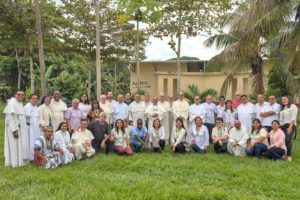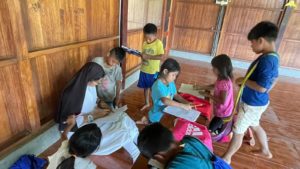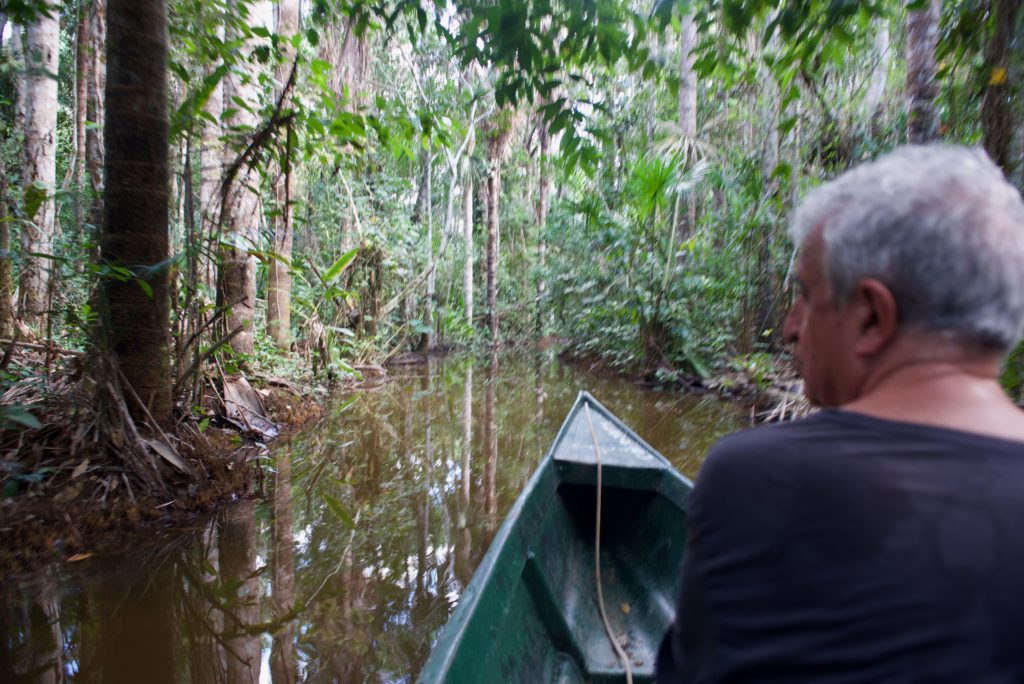By Sister Zully Rojas Quispe
Dominican Missionary of the Rosary FEDERATION OF DOMINICAN SISTERS OF PERU
Why care about the Amazon?
The "cry of the earth" is an expression used in the context of the papal encyclical "Laudato si'" and other ecclesiastical documents related to environmental concerns. It describes the suffering and degradation that nature experiences as a result of human activity, including deforestation, pollution, climate change and biodiversity loss. Pope Francis has emphasized throughout his writings the importance of listening and responding to the "cry of the earth" as part of the moral responsibility to care for God's creation.
The "cry of the earth" from "Dear Amazonia" refers to the call for awareness and action to protect the Amazon and its natural environment, and to address the environmental and social challenges facing this important region for the world.
Amazonian ecology refers to the study of the ecosystems present in the Amazonia region, which covers most of the Amazon River basin in South America. This region is known to be one of the most biodiverse and species-rich areas in the world, with a great variety of plants, animals, microorganisms and habitats.
Perhaps it is not entirely correct to say that the Amazonia is the "lung" of the planet, or at least this "lung" is more blue (because of the oceans) than green (because of the forests). However, this in no way detracts from the enormous environmental importance of the Amazonian ecosystem for a number of reasons: Because of its biological and cultural diversity AND because it plays a very important role as a climate regulator.
For two reasons:
• First, because it is an enormous reservoir of carbon and a generator of humidity that produces cooling;
• and second, because the Amazon biomass is so enormous that burning releases a large amount of carbon into the atmosphere.
Prayer for the Land
God of all creation, How splendid and majestic is the world you created! It reveals your glory to us; it teaches us about you. When you made us in your image, you gave us this commandment: To care for the world and all the creatures in it, because this is our common home. Yet your holy creation cries out, for our house is "oppressed and devastated", burned and marked.
Come among us so that we remember our interdependence. Let us see the face of your Son in those who are suffering. because of the destruction of our common home. Help us to be good stewards who honor you in the world you have created for the good of all creation and for future generations.
May your justice reign forever! Amen
~Pope Francis, Laudato si’, No. 02.
Arguably, the most decisive environmental importance of the Amazonia does not lie so much in what comes from nature, but in what the destruction of its nature can generate: no other natural environment in the world has as much polluting capacity as the burning of Amazonian biomass. Potentially, the Amazonia may be the world's largest natural carbon emitter, or in other words, the Amazonia could potentially be the largest polluting agent on the planet.
For all these reasons, the analysis of existing threats to the conservation of the Amazon ecosystem is of great relevance at the regional and global level. Despite its great ecologic importance, the Amazonia faces numerous threats, such as deforestation due to agricultural expansion, illegal mining, dam construction and natural resource extraction. These human activities threaten both biodiversity and the ecosystem benefits that the region provides. Conservation efforts include the creation of natural reserves, the implementation of sustainable management policies and the collaboration between governments, non-governmental organizations and local communities.
Illuminate
The Dominican Family around the world calls us once again for "The Dominican Month for Peace", which begins this first Sunday of Advent, December 3rd and lasts until Christmas. This year we will focus our attention on the Amazonia.
During the meeting of the Dominican Family, held during the first week of July in the Madre de Dios Region, in the Amazonian territory, we expressed various dreams and commitments as we set foot on this "sacred land" that welcomed us in its uniqueness, in its biodiversity, in its open wounds caused by the irresponsible actions of human beings and in its hope for "the defense of life, territory and culture".
Advent, the liturgical season in which we contemplate and welcome the Lord who comes to meet us, presents us this first Sunday with the Gospel text Mk 13:33-37. I want to highlight two phrases that in the reading as a whole are synonymous and ARE THE MAIN RECOMMENDATION OF JESUS:
"Watch and be prepared" and "be vigilant"... We can ask ourselves what should we watch for? What should we be prepared for, and be vigilant? I remember an affirmation of our brother Timothy Radcliffe "in the Order we are all called to be contemplative, because we must all seek God, who always comes to meet us".
Based on the proposal of the Dominican Month for Peace, the Amazonia becomes a propitious place to find answers to our questions and our search. To contemplate the Amazonia is a gift, and to discover God in it is a grace. The Amazonia gives us back the voice and the song of God through all its creatures.
The Mystery envelops us and embraces us like the rivers embrace the forest, giving us back the freshness and vitality of those who find in it the source of life.
In recent times the universal Church, through various events and the Magisterium of Pope Francis, is making the Amazonia visible both with all its beauty and in all its ugliness and pain. There are several ways of moving from the periphery to the center that offer the possibility of an integral conversion at the personal, community and institutional levels, in order to continue dreaming and making a fair, fraternal and peaceful world a reality.
As our brothers and sisters of REPAM and CEAMA say, "The Amazonia is not only a region, but a paradigm that calls and poses challenges to new postures and behaviors with the imperatives of caring for the Common Home as a dimension of the evangelizing action and the respect and acceptance of the native peoples as interlocutors and subjects of an enculturated evangelization".
Exercising attentive vigilance in the midst of contradictions, threats, losses, deaths, etc. present in the Amazon implies keeping in mind that the presence of the Order of Preachers in this territory is a mission entrusted by the Lord, and we have the responsibility to help the local church to model its face based on the essential features of the cultures that populate these lands. In this sense, let us remember what the final document of the Synod for the Amazon says: "Only an inserted and enculturated missionary Church will promote the emergence of particular autochthonous churches, with an Amazonian face and heart, rooted in the people’s own cultures and traditions, united in the same faith in Christ and diverse in their way of living, expressing and celebrating it” (42).
 The Amazonia speaks to and challenges our prayer, preaching, study and community life; that is to say, it speaks to our lifestyle, our spirituality. We are told of Dominic of Guzman, whose incarnated spirituality, of insertion in the world, progressed as he went deeper into the knowledge and compassion of suffering humanity; so too, we who follow Jesus of Nazareth, under the Dominican charism, must live and contemplate Amazonia as "a missionary option capable of transforming everything, so that customs, styles, schedules, language and every ecclesial structure become a suitable channel for the evangelization of today's world rather than for self-preservation" (EG 27).
The Amazonia speaks to and challenges our prayer, preaching, study and community life; that is to say, it speaks to our lifestyle, our spirituality. We are told of Dominic of Guzman, whose incarnated spirituality, of insertion in the world, progressed as he went deeper into the knowledge and compassion of suffering humanity; so too, we who follow Jesus of Nazareth, under the Dominican charism, must live and contemplate Amazonia as "a missionary option capable of transforming everything, so that customs, styles, schedules, language and every ecclesial structure become a suitable channel for the evangelization of today's world rather than for self-preservation" (EG 27).
Hence, contemplating the Amazonia with the eyes and heart of faith is an attitude of profound fidelity to God, to life and to history. A Church "defender of justice and advocate for the poor". (DAp. 395), will have in our preaching the certainty that prophecy finds sure paths, because we speak and denounce without fear, we nourish hope and we commit ourselves to peace and justice, which are born of contemplative compassion, in the style of Dominic.
Brothers and sisters, believers and non-believers: every Advent we celebrate is an opportunity to show our attentive vigilance for life, because to be vigilant is to take care of the only common home we have. To be vigilant is to discover that "Everything is interconnected" and that we can all contribute to the care of life, based on trust in God who, time and again, entrusts us with the care of his creation. To be vigilant and prepared is proper for those who take responsibility for the treasure entrusted to them by their Lord. On this road to Bethlehem, may the Amazonia allow us to travel together along the great river of life, with an attitude of listening and humility of those who know they are learners and seekers of God in everything that surrounds them. May we "cultivate without uprooting, grow without weakening identity, promote without invading..." (QA 28).


